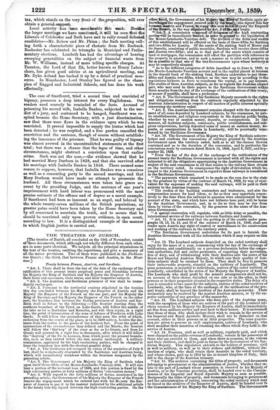The case of Smethurst, tried a second time and convicted
of bigamy, possesses a deep interest for every Englishman. Our readers need scarcely be reminded of the facts. Accused of poisoning his second wife, Isabella Bankes, subjected to the ver- dict of a jury, and sentenced to be hanged, Smethurst was re- spited because the Home Secretary, with a just discrimination, saw that there were flaws in the evidence upon which he was convicted. It proved impossible to supply the hiatus which had been detected ; he was respited, and a free pardon cancelled the conviction and the sentence, though of course without establish- ing the innocence of the prisoner. That he was guilty of bigamy was almost avowed in the uncontradicted statements at the first Vial ; but there was a chance that the lapse of time, and other circumstances, might obstruct a conviction upon that earlier crime. Such was not the case,—the evidence showed that he had married Mary Durham in 1828, and that she survived after his marriage with Isabella Bankes in 1858. There seemed some reason to suppose, however, that Isabella Bankes was a conscious as well as a consenting party to the second marriage, and that Mary Durham would have made no attempt to prosecute the husband. All these circumstances were taken into grave ac- count by the presiding Judge, and the sentence of one year's imprisonment with hard labour was pronounced with the most precise estimate of the offence and of degree as a moral example. If Smethurst had been as innocent as an angel, and beloved by the whole twenty-seven millions of the British populations, no greater pains could have been taken by the Home Secretary and by all concerned to ascertain the truth, and to secure that he should be convicted only upon proven evidence, in open court, according to law. It is a distinguished example of -the manner in which English justice is carried out.


























 Previous page
Previous page